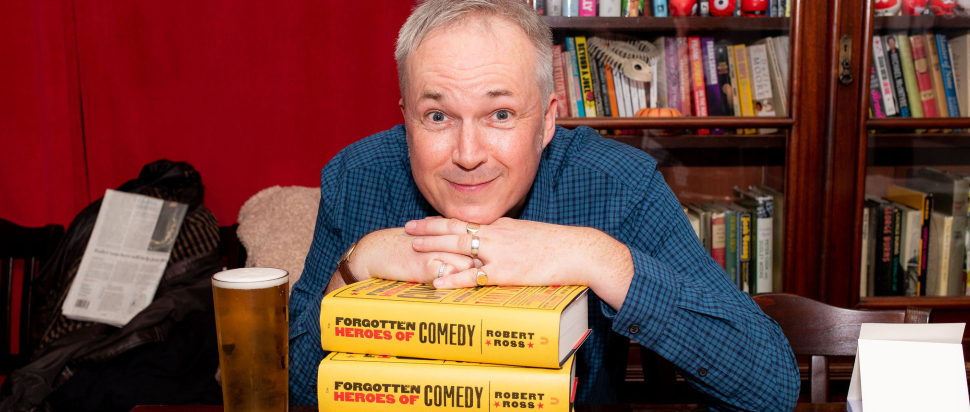Comedy historian Robert Ross on his new book
Comedy historian Robert Ross talks to us about his new book, which shines an overdue spotlight on more than a century of overlooked comic greatness
Almost 20 years have passed since the late Terry Jones first put to Robert Ross the idea of writing Forgotten Heroes of Comedy. In the years that followed, publishers seemed turned off by the word ‘forgotten’. If they’re forgotten heroes, who will want to know? Yet with the arrival of the book’s eventual publisher, Unbound, Ross and Jones were finally able to answer that very question. Inside are the names of everyone who pledged through Unbound’s crowdfunding platform, on which only the projects that are fully-funded go to print. The results are often passion projects like this one, or Jones’ Evil Machines, “which was book number one for Unbound. So that was the beginning, via Terry, really,” says Ross.
A friend to the likes of the Pythons and Barry Cryer, Ross has written 18 books on comedy. His last was a biography of Marty Feldman, perhaps best remembered as Young Frankenstein’s Igor. But so many legacies remain unpreserved. So, here it is; what one might be tempted to call a definitive encyclopaedia of overlooked comics. Encyclopaedia, yes; definitive, certainly not. “It was just a sort of wayward labour of love really… celebrating people that myself and Terry really admired and felt had been neglected or had fallen between the gaps in social and comedy history,” he says. “[We sat down] in a pub in north London just to make a long list of people we thought should be in it, and it was very much a personal choice. But there’s more than enough for volume two and volume three if I’ve got enough years in me to write them.”
Seeing the 100-or-so mini-biographies bound together like this, it’s tempting to siphon the acts into reasons for their obscurity. Some are painfully practical: “A lot of the [footage] was junked of course… The TV stuff either went out live or the recordings were subsequently erased and re-used. So the actual lack of archive stuff is important.” Other reasons will be familiar to fans of modern entertainment of any kind, owing to an industry where talent comes second to image. The forgotten George Williams, for example, was jailed in the 1950s for his sexuality. The book features one of his contemporaries whose act walked a fine line to avoid the same fate. Ross tells us: “There’s a comedian in it called Rex Jameson who did a sort of drag act as Mrs Shufflewick. [He] obviously was a gay performer, but because he went so extreme [with] this mad, honest deconstruction of the pantomime dame… he got away with it. But it’s a shame [that] it’s really why some people are sort of putting it in the dustbin of showbiz history.”
Across the pond, racial stereotypes limited the opportunities of performers like Willie Best. “I’m a huge fan of his,” says Ross. “His one major performance is a thing called The Ghost Breakers [1940]. He’s a man-servant in it, but he’s a double-act with Bob Hope [and] that was all they got offered, African-American performers... It was either do those or not work, basically.”
Of course, the same has always been true for women. Those featured in the book brought their overlooked talent to much-limited roles. For the great Patsy Rowlands, those were Carry On... wives which later led to peer snobbery; for Debbie Linden in the 70s, underwritten glamour-girls.
Don Arrol and Harold Berens sidestepped their own potential pigeonholes with bold personas. Both hailed from Glasgow yet one affected an American Broadway twang, while the other gave off the air of ‘a long-established East End tailor’. “You [would] rub away the edges of your early life to get more work,” says Ross.
Whatever the reasons for these comics to have left public consciousness, the book isn’t an investigation into what makes a lasting legacy. Nor does it try to criticise. Its aim is to “make people go back and reassess these people if they fancy. After reading four, five, six, seven pages about them, hopefully they’ll invest in an LP or a Blu-ray box set or something and try to find more about them.” Ultimately, Ross says, “I’m hoping that if even three of these people strike you as somebody [who makes you think] ‘Oh, I want to look into more of their work’, then that’s job done really.”
Forgotten Heroes of Comedy: An Encyclopedia of the Comedy Underdog is out now via Unbound
